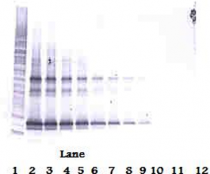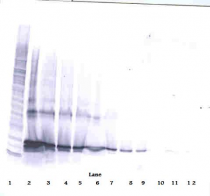ARG66070
anti-CD258 / LIGHT antibody (Biotin)
anti-CD258 / LIGHT antibody (Biotin) for ELISA,Western blot and Human
Overview
| Product Description | Biotin-conjugated Rabbit Polyclonal antibody recognizes CD258 / LIGHT |
|---|---|
| Tested Reactivity | Hu |
| Tested Application | ELISA, WB |
| Host | Rabbit |
| Clonality | Polyclonal |
| Isotype | IgG |
| Target Name | CD258 / LIGHT |
| Antigen Species | Human |
| Immunogen | Hi-5 Insect cells derived recombinant Human LIGHT / CD258. (RLGEMVTRLP DGPAGSWEQL IQERRSHEVN PAAHLTGANS SLTGSGGPLL WETQLGLAFL RGLSYHDGAL VVTKAGYYYI YSKVQLGGVG CPLGLASTIT HGLYKRTPRY PEELELLVSQ QSPCGRATSS SRVWWDSSFL GGVVHLEAGE KVVVRVLDER LVRLRDGTRS YFGAFMV) |
| Conjugation | Biotin |
| Alternate Names | CD258; Herpes virus entry mediator ligand; HVEML; HVEM-L; Herpesvirus entry mediator ligand; LTg; LIGHT; CD antigen CD258; TR2; Tumor necrosis factor ligand superfamily member 14 |
Application Instructions
| Application Suggestion |
|
||||||
|---|---|---|---|---|---|---|---|
| Application Note | * The dilutions indicate recommended starting dilutions and the optimal dilutions or concentrations should be determined by the scientist. |
Properties
| Form | Liquid |
|---|---|
| Purification | Purified by affinity chromatography. |
| Buffer | PBS (pH 7.2) |
| Concentration | 1 mg/ml |
| Storage Instruction | Aliquot and store in the dark at 2-8°C. Keep protected from prolonged exposure to light. Avoid repeated freeze/thaw cycles. Suggest spin the vial prior to opening. The antibody solution should be gently mixed before use. |
| Note | For laboratory research only, not for drug, diagnostic or other use. |
Bioinformation
| Database Links |
Swiss-port # O43557 Human Tumor necrosis factor ligand superfamily member 14 |
|---|---|
| Gene Symbol | TNFSF14 |
| Gene Full Name | tumor necrosis factor (ligand) superfamily, member 14 |
| Background | The protein encoded by this gene is a member of the tumor necrosis factor (TNF) ligand family. This protein is a ligand for TNFRSF14, which is a member of the tumor necrosis factor receptor superfamily, and which is also known as a herpesvirus entry mediator (HVEM). This protein may function as a costimulatory factor for the activation of lymphoid cells and as a deterrent to infection by herpesvirus. This protein has been shown to stimulate the proliferation of T cells, and trigger apoptosis of various tumor cells. This protein is also reported to prevent tumor necrosis factor alpha mediated apoptosis in primary hepatocyte. Two alternatively spliced transcript variant encoding distinct isoforms have been reported. [provided by RefSeq, Jul 2008] |
| Function | Cytokine that binds to TNFRSF3/LTBR. Binding to the decoy receptor TNFRSF6B modulates its effects. Activates NFKB, stimulates the proliferation of T-cells, and inhibits growth of the adenocarcinoma HT-29. Acts as a receptor for Herpes simplex virus. [UniProt] |
| Calculated MW | 26 kDa |
| PTM | N-glycosylated. The soluble form of isoform 1 derives from the membrane form by proteolytic processing. |
Images (4) Click the Picture to Zoom In
-
ARG66070 anti-CD258 / LIGHT antibody (Biotin) WB image
Western blot: 250 - 0.24 ng of Human LIGHT stained with ARG66070 anti-CD258 / LIGHT antibody (Biotin), under non-reducing conditions.
-
ARG66070 anti-CD258 / LIGHT antibody (Biotin) standard curve image
Direct ELISA: ARG66070 anti-CD258 / LIGHT antibody (Biotin) at 0.25 - 1.0 µg/ml results of a typical standard run with optical density reading at 405 - 650 nm.
-
ARG66070 anti-CD258 / LIGHT antibody (Biotin) WB image
Western blot: 250 - 0.24 ng of Human LIGHT stained with ARG66070 anti-CD258 / LIGHT antibody (Biotin), under reducing conditions.
-
ARG66070 anti-CD258 / LIGHT antibody (Biotin) standard curve image
Sandwich ELISA: ARG66070 anti-CD258 / LIGHT antibody (Biotin) as a detection antibody at 0.25 - 1.0 µg/ml combined with ARG56832 anti-CD258 / LIGHT antibody as a capture antibody. Results of a typical standard run with optical density reading at 405 - 650 nm.









